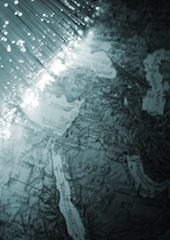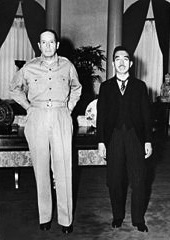Syria, Iran and American Forgetfulness
Which nation is the key enabler of Iran’s steady rise in the Middle East?
June 17, 2013

The Middle East is in ever more turmoil. In the U.S. debate, most of the blame is conveniently laid at the feet of a single country, Iran. Not that the regime steered by the mullahs is any kind of nice guy. Far from it.
Among their worst sins is that they systematically oppress the aspirations of a very talented young generation of Iranians. But that doesn’t justify the American inclination to make Iran the end all and be all of evil on an issue such as Syria.
In the words of an unnamed State Department official, “If anything gets us moving, it will be the Iran threat.” And what is that threat? “Right now, Iran is winning the strategic game in the region.”
Mark that down as a typical Washington move of using one’s own sworn enemy as a key motivational tool.
That stimulus-response pattern is stunning in its naïveté: We’re Americans, aren’t we? We’re the good guys. Our traditional role is to rein in the bad guys, like Iran, isn’t it? Therefore, let us now all resolve to push the Iranians back.
Even assuming the broader validity of this narrative (and leaving the systematic frustration of Iran’s true democratic aspirations during the Mossadegh era in the 1950s aside), there is one little problem with this rendition of the realities on the ground in the Middle East.
No nation has ever been a better de facto friend of the regime of the mullahs in Iran than the U.S. government under George W. Bush.
And no nation has been a bigger enabler of the machinations that the Iranian regime is no doubt capable of pursuing than the United States during the past decade.
With one completely idiotic move — the invasion of Iraq — George W. Bush accomplished what Iran had tried many times before and had failed to accomplish: Grinding down the power of the Sunnis in neighboring Iraq.
Now that this disastrous mission has been accomplished, much of the Middle East is turning into a house of cards.
Sunni-Shia conflicts, frozen in time for decades if not centuries, are breaking open. Who dunnit? Washington certainly provided the trigger. Not the Iranians.
The Iranian regime, for its part, is truly delighted to exploit the completely unexpected gift from the United States.
In their chambers, the mullahs and their political operatives must still have a hard time believing the strategic gift that landed in their lap thanks to Washington’s collective inanity.
Of course, the American foreign policy mind is characterized by three particular traits: It is stunningly ahistorical, agnostic about real culpability and forever optimistic about the nation’s ability to fix things, even after royal screw-ups.
The fact of the matter is that the U.S. strategists ought to have learned by now that, in their continuous effort to ride the tiger (that is, the Muslim world at large), they are failing. They have unleashed forces that they will not be able to bottle up again.
The only thing that will “fix” what’s gotten unhinged is the Muslim world itself.
It is preposterous to think the United States could interfere or reshape things. With what? NSA listening devices and drones?
A war of civilizations that has been kicked off, but it’s not about the West vs. Islam, as much as Huntington et al. wanted us to believe. It’s a war of civilizations within Islam.
In all likelihood, a severe battle between Shia and Sunnis in the Middle East was inevitable at some point. But at a minimum, it was the United States that chose to accelerate the time frame for it, with the disastrous consequences we now witness.
When will they ever learn?
Currently, yet another generation of foreign policy whizzes — the aptly named Rhodes-Rice-Power trio — is taking the reins in Washington. They no doubt feel honor-bound to leave their mark on the global stage.
There is so much injustice to contend with. And so much need for the forces of good to speak up loud and clear.
Hence, the big — but in all likelihood empty — words about holding the Assad regime in Syria accountable for its chemical weapons misdeeds.
In the abstract, that may well be justified. However, for a nation that has carelessly excelled by conducting foreign policy via pouring oil onto fire, it is not a promising strategy.
What we are ultimately in for is a replay of the game that played out a generation ago with U.S. trade officials.
There was a time when U.S. Trade Representatives could act like cowboys on the global stage. They pretty much ruled the global trade jungle.
It took these U.S. officials quite a while to learn that they were, in effect, incapacitated. And it took them much longer still to admit their near-complete loss of power before the American public.
In Washington, as in politics in general, appearances matter. If you can make the home folk believe that you are still powerful, you still are.
But that is true only in the domestic perceptions game. Internationally, you become more and more of a laughing stock, known for your neediness and overplaying your hand, while demanding from your allies that they keep up the pretense.
Sounds good — except that it’s really not an ally’s job to maintain the fakery. A good ally calls the counterpart onto the carpet for a reality check, much like adolescents do on occasion with overpowering (and overbearing) adults.
Unless the U.S. government stops overplaying its hand in the home theater soon, Washington’s elites, including the media, are going to be in for a rude disappointment.
For all the talk of being the world’s sole superpower, they are increasingly playing an empty hand.
The American people seem to have learned a lesson from all the false hype over Iraq and Afghanistan, two maneuvers that are ending up as spectacular failures.
Thankfully, the American people no longer seem prepared to follow their misleaders on yet another adventure, no matter how loud Senators McCain and Graham and certain editorial writers decry that wise choice.
Takeaways
No nation has ever been a better friend of the Iranian regime than the U.S. under George W. Bush.
Sunni-Shia conflicts, frozen in time for decades if not centuries, are breaking open.
U.S. foreign policy is ahistorical, agnostic about culpability and optimistic about its ability to fix things.
A war of civilizations has started, but it's not the West vs. Islam. It's among civilizations within Islam.
In Washington, if you make the home folk believe that you are still powerful, you are.
The American people have learned a lesson. They no longer want to follow their misleaders on yet another adventure.
Read previous

Japan: The World’s Really Lucky Country
June 16, 2013
